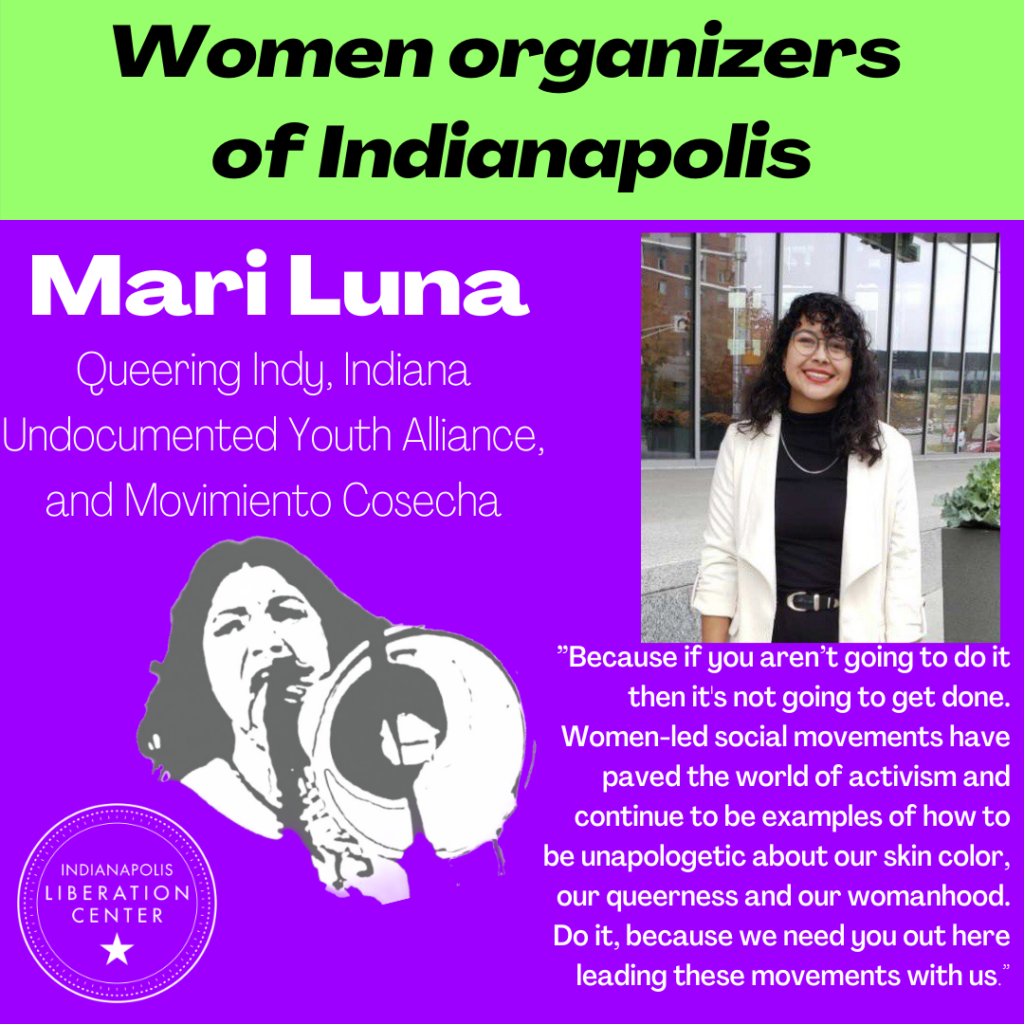During the Trump administration, there was little question as to where the left should stand: “Abolish ICE”, “stop the deportations”, “free the kids in cages” were among the rallying cries heard in marches across the U.S. Yet the narrative amongst the liberal wing of the movement shifts once a Democrat is in the office, as we’ve seen in the first month of Biden’s administration. “Kids in cages” becomes “unaccompanied minors in holding facilities”, “Abolish ICE” becomes “give him time”, and “stop the deportations” is transformed into deafening silence. These are not the words of people who must struggle to live with dignity and respect, nor the words of women workers who make the world run regardless of what country they’re in.
The workers’ struggle has no borders, and for Mari Luna, the struggle continues with or without the support of the liberal wing of the movement.
Mari Luna, who began organizing while attending university, is active in several struggles. Mari (she/her/ella) is part of Queering Indy, Indiana Undocumented Youth Alliance, and Movimiento Cosecha.
“My involvement in organizing,” she told the Indianapolis Liberation Center, “was both gradual and sudden. I was a freshman in college when I started my organizing journey through unions and labor rights. I was able to participate in my first several civil disobedience actions and organizing campaigns. While learning more about what grassroots organizing meant, I found myself drawn to community-led, ‘boots on the ground” organizing.’
Mari emphasized the importance of finding spaces to organize in without having to compartmentalize or hide the diverse aspects of herself. “It was bad-ass undocumented women who took me under their wing and showed me how to do that unapologetically.”
Under their mentorship, Mari began putting the pieces together about the ways various forms of oppression coexist and depend on each other under imperialism:
“I started to gradually learn more about different systems, tactics, the needs of the community and ultimately how to organize for the liberation of all people. “
Being so intimately involved with multiple organizations has been innately empowering and healing for Mari, giving her the tools and knowledge to fight for the liberation of all.
“It involves building on the work of previous women, specifically Black, Brown and Trans women, therefore I try to continue the work of our ancestors and for the future generations who will have to do it after me,” Mari continued.
While Mari is no stranger to revolutionary political theory, she told us about how the acute combination of study and struggle makes all the difference through synthesizing theory and practice.
“My political outlook has radically changed as I became more involved with organizing. Reading about feminist, Marxist and critical race theory is one thing, but you don’t really grasp the contents until you are seeing it unfold in the communities you serve first hand,” she continued. “Learning about the different ‘-isms’, political and economic structures, and learning about issues outside my own identities, has guided me to be an organizer who believes it’s up to us, the people, to dismantle, abolish and rebuild.”
Being an organizer is not a strictly internal affair, however, and has the great potential to impact other people and the world around you. Mari explained that she best serves that role by encouraging others to exist unapologetically; their identities, struggles, stories, and demands for freedom.
“As organizers we have influence on how people treat each other around the spaces you hold. even the way you take care of yourself is itself an influence to those around you,” Mari added.
“The way you speak to people, that way people speak to you, the way people feel around you holds great influence. As organizers we are leaders in our communities and we have to continue to be those influences that maybe you didn’t have growing up, but now you have the chance to be that for someone else.”
Organizing for revolution is organizing for survival
“The biggest challenge I have seen is how hard it is to decolonize our communities’ minds and empower them: to help them see beyond what society has told them they have to be and that they can demand just and humane treatment in their own homes, from their employers, and their governments.”
“The lack of resources,” Mari stated. “Is also a challenge. It makes it hard to reach all our people. There is a great need for our communities and while you are trying to help create or find them half the time you haven’t even found these resources for yourself.”

Being a revolutionary, as a woman, is not a choice to make frivolously, but one of survival. Mari made that plain in the challenges she has faced within her communities.
As we have seen in history, there are often detractors who pit themselves against anyone who would fundamentally change the world — even their own friends and family.
“Other challenges include having your own people be the people praying for your downfall, that phrase, “it be your own people” is very true and sad that formerly undocumented people, or people who have undocumented family, will go against their communities’ needs for selfish reasons.”In spite of this, Mari says: “Although these challenges always arise, our community is resilient, and we will continue to fight, continue to build and will continue to hold anyone accountable.”
Organizing is a dangerous affair, with many people facing arrest, stringent charges, and physical harm for their work in oppressed communities. These are not risks to be disregarded, but embraced by anyone with a revolutionary conviction. Mari, for one, encourages everyone — especially women — to get involved. “Do it,” she emphatically said.
“Because if you aren’t going to do it then it’s not going to get done. Women-led social movements have paved the world of activism and continue to be examples of how to be unapologetic about our skin color, our queerness and our womanhood. Do it, because we need you out here leading these movements with us.”

